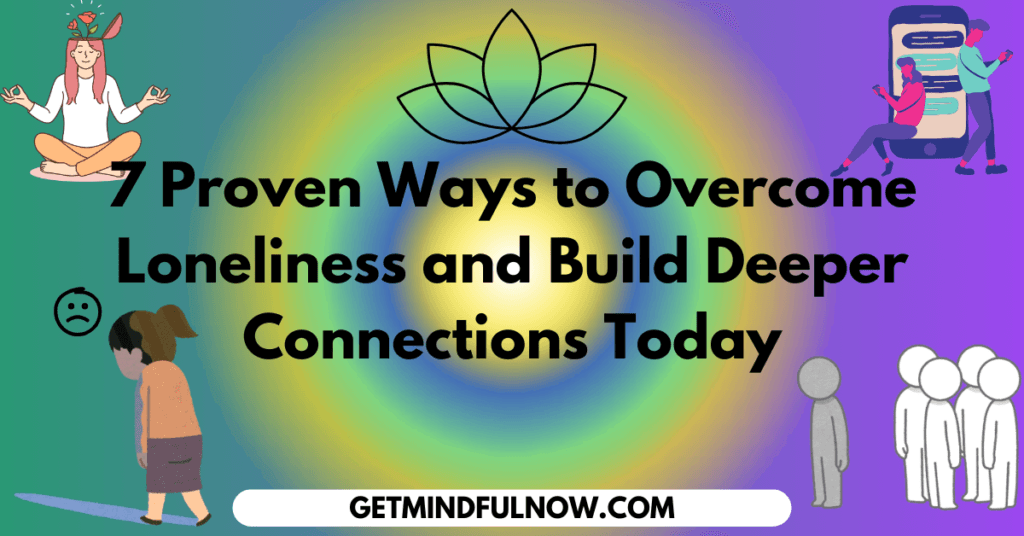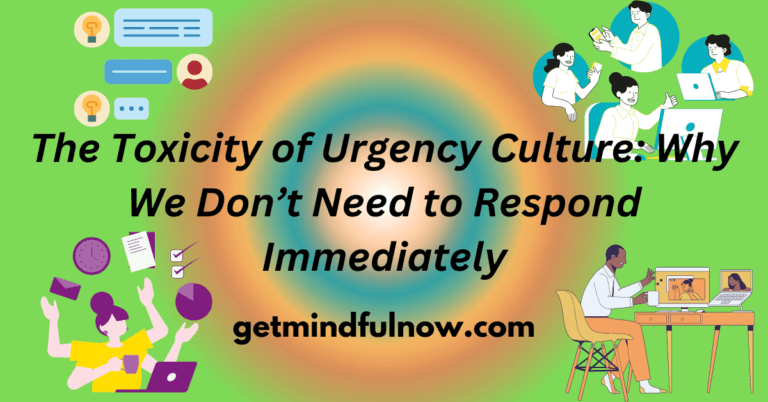We’ve all been there: your phone pings, your inbox dings, and your mind suddenly jumps to “Oh no, I need to answer this right now!” Welcome to the stress-fueled, always-on-call world of urgency culture. Today, we’ll explore why it’s actually okay (and even beneficial) to hit pause before responding, and why being in constant communication might be more harmful than we think.
Urgency culture is that overwhelming sense that we must respond, act, and react immediately—no matter the time or place. From quick replies to constant notifications, it seems like our lives are on fast-forward. It’s like we’ve replaced “BRB” with “I’m never gone.” The pressure is real, but guess what? It doesn’t have to be.
Why We Feel We Must Respond Right Away
Let’s start by tackling why so many of us feel this urge to reply instantly. A lot of it is about expectation: we live in a time when being connected all the time is the norm. It’s the digital age equivalent of your parents expecting you to answer the landline on the first ring. And when you don’t respond? Enter the guilt and anxiety.

Now, why is that? According to research from the American Psychological Association, our brains are wired to react to these notifications almost like they’re emergencies. We get this tiny spike of adrenaline, which was great back in the day when we needed to dodge saber-tooth tigers. But now, it’s just that one coworker asking about the TPS reports. Hardly life or death, right?
The Harmful Effects of Constant Communication
Urgency culture doesn’t just make us feel guilty; it actually impacts our mental health. The constant pressure to be “on” can lead to chronic stress. In the long run, this can lead to burnout, depression, and anxiety. When we’re always checking our phones and emails, we’re essentially telling our brains that there’s no rest time.
And this need to always be connected isn’t good for our relationships, either. Have you ever been in a conversation and felt like the other person is just waiting for their turn to check their phone? It doesn’t exactly make you feel valued, right? It’s a real quality-over-quantity problem. We’re talking to each other more than ever but saying less that really matters.

Tech Doesn’t Mean We Need to Be Available 24/7
Just because we can send messages instantly doesn’t mean we should reply right away. In fact, taking a little time can actually improve the quality of our communication. When you’re not rushed to reply, you have time to think about your response and offer something meaningful rather than just a quick “Sure” or “Got it.”
It’s like when we shifted from snail mail to email. Email was great because it was fast, but we didn’t feel compelled to answer emails immediately. Then came texting, and the reply expectations started to get faster and faster. Now, with instant messaging apps, we’re basically expected to be available 24/7. But we don’t have to be. And setting boundaries can help.
Setting Boundaries and Letting Go of Guilt
So, how do we break free from this urgency culture? The first step is recognizing that it’s okay to set boundaries. For instance, you could set specific times to check and respond to messages. This way, you’re not constantly interrupted, and you can be more present in what you’re doing.
But let’s be real: even if you set boundaries, you might still feel that nagging guilt. So here’s a trick—remind yourself that not responding immediately doesn’t make you a bad person. People will understand. And if they don’t, that’s more about their urgency than yours.

My Story: Breaking Free from Obligations and Rediscovering Boundaries
For a while, I found myself caught up in the very urgency culture I now encourage others to avoid. My mother-in-law would call every other day, and due to cultural expectations, I felt compelled to answer right away. These conversations were thought to be important, but they rarely brought much value. Often, they consisted of the same small talk about food, the weather, and other day-to-day topics. Before I knew it, 40 minutes would slip by, and I’d be left scrambling to pick up the pieces of the tasks I’d abandoned to take the call.
As someone with a background in neuroscience and epigenetics, I knew well what this constant obligation and suppressed stress was doing to my well-being. The calls were draining me, both mentally and emotionally. But I continued to answer, dutifully responding to each topic as it came up, trying my best to sound engaged—even when I felt like I was on autopilot. I’d been raised to be a people-pleaser, which only made it harder to break the cycle. Deep down, I was desperate for a more meaningful exchange.
So, I tried to steer our conversations toward quality topics—ones that I thought could help her in areas where she often voiced her concerns. I started talking to her about health and wellness, subjects she’d frequently mentioned but never explored deeply. And guess what? She either ignored my attempts to share valuable information, or she quickly changed the subject. I began to feel resentful. Why was I sacrificing my time and energy to be part of these exchanges, only to feel unheard and frustrated?
It became clear that something had to change. I started letting the non-urgent calls go unanswered and only responded when I was actually available, mentally and emotionally. At first, she wasn’t pleased. She even blamed me for not picking up right away. But that was a turning point for me. I took a deep breath, and we had a firm, honest conversation about it. I explained that while I valued our relationship, I needed to set some boundaries. I was no longer willing to drop everything and have lengthy, unproductive conversations every other day. In this fast-paced world, I needed to prioritize my time and well-being.
Luckily, she understood. And in that moment, I realized something I now share with my clients: if someone truly wants you in their life, they will adjust. Boundaries aren’t walls—they’re bridges to healthier relationships. I’d spent much of my life being a chronic people-pleaser, working hard to find my self-worth outside of others’ opinions. But this experience was a reminder that it’s not selfish to protect your time and energy; it’s essential.
So, to anyone struggling with the pressure to always be available, know that setting boundaries doesn’t make you a bad person. If anything, it makes you a more present and genuine one. And if the people in your life value you, they’ll learn to respect that, too.
Practical Tips to Reduce the Pressure of Urgency Culture
So, how do we escape the toxicity of urgency culture? One of the most important steps is learning to set boundaries, both with ourselves and others. Here are some practical tips:
- Give Yourself Permission to Pause: It’s okay not to respond immediately. If you’re in the middle of something important or just need a break, give yourself permission to wait. Take time to think about your response and prioritize quality over speed.
- Communicate Your Availability: If you’re worried about people expecting an instant response, set clear expectations. Let them know when you’re available and when you’re not. For example, if you’re off work or busy with a personal task, communicate that you’ll get back to them when you’re free.
- Turn Off Non-Essential Notifications: One of the simplest ways to break free from urgency culture is to reduce the constant barrage of notifications. Turn off the ones that aren’t necessary, so you’re not distracted every time a message pops up. This can help you stay present in the moment.
- Create “No-Phone” Times: Dedicate certain times of the day to being phone-free. Whether it’s during meals, when you’re working on a project, or while you’re relaxing, having time away from your phone can reduce the anxiety of feeling like you need to be available.
- Don’t Assign Meaning to Delayed Responses: Not everyone operates on the same schedule, and that’s okay. Just because someone doesn’t reply right away doesn’t mean they’re ignoring you or don’t care. Give people the benefit of the doubt and understand that everyone has different priorities and responsibilities.
- Shift the Focus to Quality: Instead of rushing to respond, take time to engage in more meaningful conversations. When you do reply, focus on being present and thoughtful rather than just trying to keep up with the pace of communication.

Why We Need to Embrace Delayed Responses
When you start taking your time with replies, you’ll notice a few things. First, the world doesn’t end. Life goes on, and most people will just wait for your answer. Second, delayed responses give you a chance to be thoughtful. You’ll probably find that the quality of your communication improves when you’re not rushing.
Finally, by breaking free from urgency culture, you can start to reclaim some of your time. Imagine a day where you don’t feel glued to your phone, where you can actually enjoy a meal or a movie without feeling that itch to check your notifications. Sounds pretty nice, right?
FAQ: Breaking Down Urgency Culture
Q: What’s the harm in responding immediately?
A: The harm is in feeling like you have to respond. It creates constant stress and keeps your brain in an always-alert state, which can lead to burnout and anxiety.
Q: How can I communicate my boundaries without offending people?
A: Honesty is the best policy. Tell people you’re setting up some “tech-free” time, or that you’re trying to be more mindful about when you respond. Most people will totally get it!
Q: Why do I feel guilty when I don’t reply right away?
A: Guilt often comes from the pressure to meet other people’s expectations. Remember, you have a right to your own time and space.
Q: Is urgency culture a new phenomenon?
A: While the need for instant responses isn’t exactly new, technology has made it a lot more intense. In the past, we had time to respond, but now, with instant messaging, the pressure is always there.
Q: What can I do to help others break free from urgency culture?
A: Set a good example! Respect other people’s boundaries and don’t expect immediate responses from them. And let them know it’s okay to take their time, too.
By understanding and addressing urgency culture, we can start living in a way that’s less about instant replies and more about genuine, meaningful connection. We’re not robots (yet!)—we’re humans, and we deserve a break. So, go ahead, take a deep breath, and let that message sit for a bit. You’ll thank yourself later.









Muy bein
Really Nice blog.
I didn’t know you had background in neuroscience and epigenetics.
Thanks. Yes, it’s been over five years since I started studying and applying these sciences for a holistic approach to changing our lives. My blogs reflect this journey.
kamal blog likha ha
Maza aya read kr ky and jo story sath add ki mother in law wali wo bhi 1 achi hook thi audience ky lia
Amazing MasaAllah
This article really resonated with me! I’ve been feeling the pressure of urgency culture and the stress that comes with it. Your insights on the importance of taking our time and not feeling obligated to respond immediately are so refreshing. I’m learning to prioritize my well-being over the constant rush. Thank you for this eye-opening perspective!